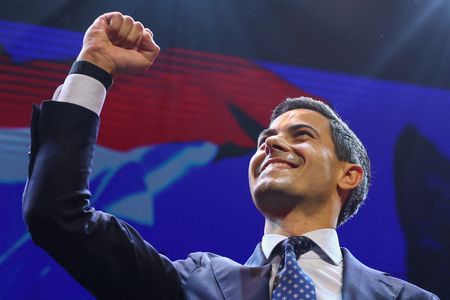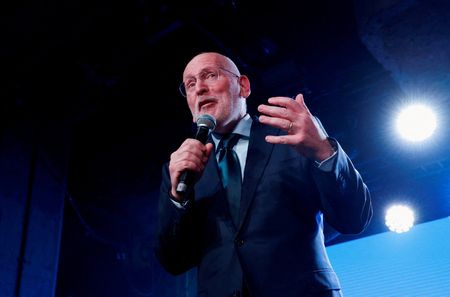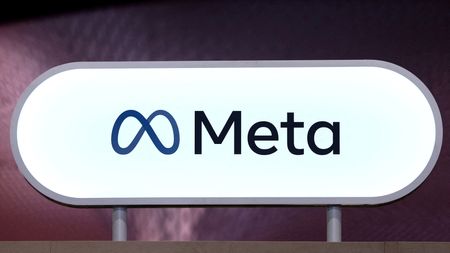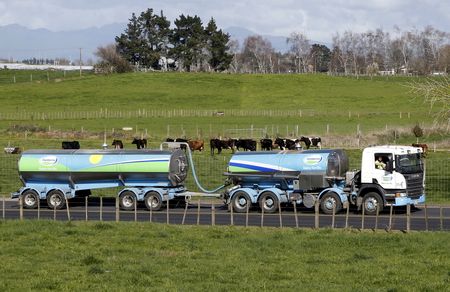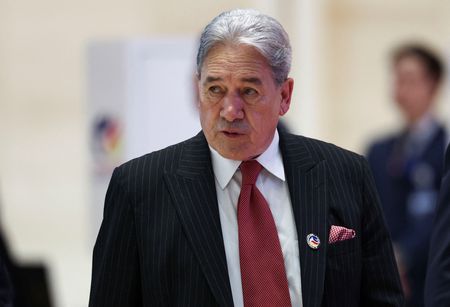By Bart H. Meijer, Toby Sterling and Anthony Deutsch
THE HAGUE (Reuters) -The centrist D66 party was on course to win the most votes in the Dutch national election and defeat the far right, exit polls showed on Wednesday, opening a path for its leader Rob Jetten to form a government as the youngest ever prime minister of the Netherlands.
Two exit polls projected D66 to win 27 seats in the 150-seat lower house of parliament, beating far-right leader Geert Wilders’ Freedom Party on 25. The polls have a margin of error of up to three seats.
Cheers and chants of “Yes, we can” broke out at the D66 election night celebration as the crowd waved Dutch flags.
“One thing is very certain,” Jetten told the crowd. “Millions of Dutch people today turned a page and said farewell to the politics of negativity, of hate, of endless ‘no we can’t’.”
“Let’s turn the page on Wilders and work on a splendid future for our beautiful country.”
The popularity of 38-year-old Jetten surged in the past month, as he campaigned on a promise to resolve a housing shortage, invest in education, and tackle immigration concerns.
Wilders, one of Europe’s longest-serving populist leaders, is known for his anti-Islam stance and lives under constant protection due to death threats. He had proposed denying all asylum requests — which would violate EU treaties — sending male Ukrainian refugees back to Ukraine, and halting development aid in order to finance energy and healthcare.
Wilders led his party to a stunning first-place finish in the last election in 2023 and formed an all-conservative coalition, although his partners refused to endorse him as prime minister. He brought the government down in June over its refusal to adopt his hardline measures.
Speaking to reporters, Wilders said he was disappointed that his party had lost seats and that he would likely not be part of the next government. But he vowed to fight on from the opposition.
“Of course we would have liked to win more seats and I regret the loss, but it’s not as if we were wiped off the map,” he said.
A projection based on the vote count is expected around midnight local time (2300 GMT) but exit polls have traditionally been reliable.
TOUGH COALITION TALKS
The Dutch election was seen as a test of whether the far-right can expand its reach or whether it has peaked in parts of Europe. The outcome may suggest there are limits to its enduring appeal.
While the other mainstream parties all pledged toughened anti-immigration stances, the election result, if confirmed, indicates that Wilders’ unwillingness to compromise is also not a recipe for taking and holding power in the Netherlands, with its long tradition of consensus-building.
All mainstream parties remain committed to core international issues such as support for NATO, the EU, and Ukraine, including plans to increase military spending.
Reacting to a disappointing outcome for the Dutch Greens-Labour, former EU Commissioner Frans Timmermans stepped down as party leader. Exit polls showed the left-wing party would drop to 20 seats, down from 25 seats in 2023.
With 76 seats needed to form a governing coalition in the Netherlands’ parliament, at least four parties will be required. One scenario is a pact including D66, the conservative Christian Democrats, the centre-right VVD, and the Greens-Labour party.
However, building stable coalitions is tough and talks are expected to take months.
(Reporting by Anthony Deutsch, Toby Sterling and Bart Meijer. Additional reporting by Suban Abdulla, Marta Fiorin and Charlotte Van Campenhout. Editing by Toby Chopra and Rosalba O’Brien)




